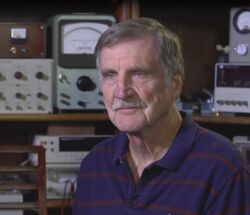Biography:Gary Babcock Gordon
Gary Gordon | |
|---|---|
 | |
| Born | November 16, 1939 Portland, Oregon |
| Education | U.C. Berkeley BSEE Stanford MSEE |
| Spouse(s) | Nicola Whitney Gordon |
Gary Gordon is a retired engineer, naval officer, associate professor at San Jose State University, Agilent Technologies Fellow, and co-founder of Cambotics, a company pioneering robotic studio camera dollies.
He is a named inventor on over 100 patents including the modern optical computer mouse,[1] and his works have been featured on over 20 journal and magazine covers. At Hewlett Packard he pioneered instrumentation for testing computer circuits including the first Logic Probe,[2][3] Logic Clip,[4][5] Logic Pulser,[6][7][8] and HP's first Logic Analyzer.[9] Subsequently he led a number of significant projects including HP's distance-measuring laser interferometer,[10] the ORCA Robot,[11] and various instruments used in analytical chemistry and bioscience. His research also included computer input devices, and in 1999 he was awarded HP's first annual Prize for Innovation[12] for co-inventing the modern optical computer mouse which measures travel by correlating successive images of the work surface.
His philanthropic interests include writing eye tracking software for controlling a screen cursor with one's gaze and the SoftSwitch[13] input device, both for paralyzed computer users, teaching radio technology at Handiham radio camps, and creating a short video showcasing their work.[14]
In 2017 the Computer History Museum produced a 45 minute video[15] and transcript[16] chronicling Gordon's career and his contributions to the development of digital computers.
References
- ↑ "Seeing eye mouse for a computer system" US patent 6433780
- ↑ "IC Logic Checkout Simplified". HP Journal (6): 14–16. 1969. http://www.hpl.hp.com/hpjournal/pdfs/IssuePDFs/1969-06.pdf#page=14.
- ↑ "Logic Probe" US patent 3543154
- ↑ "Logic Clip". HP Journal (10): 12. 1973. http://www.hpl.hp.com/hpjournal/pdfs/IssuePDFs/1973-10.pdf#page=12.
- ↑ "Logic Clip" US patent 3670245
- ↑ "Logic Pulser and Probe: a New Digital Troubleshooting Team (cover story)". HP Journal (9): 2–7. 1972. http://www.hpl.hp.com/hpjournal/pdfs/IssuePDFs/1972-09.pdf.
- ↑ "Tristate pulse generator for producing consecutive pairs of pulses" US patent 3781689
- ↑ "Current Tracer: A New Way to Find Low Impedance Logic-Circuit Faults (cover story)". HP Journal (12): 2–8. 1976. http://www.hparchive.com/Journals/HPJ-1976-12.pdf.
- ↑ "The Logic Analyzer: A New Instrument for Observing Logic Signals (cover story)". HP Journal (10): 2–16. 1973. http://www.hparchive.com/Journals/HPJ-1973-10.pdf.
- ↑ "A Two-Hundred-Foot Yardstick with Graduations Every Microinch (cover story)". HP Journal (8): 2–9. 1970. http://hparchive.com/Journals/Low-Resolution/HPJ-1970-08-Low-Resolution.pdf.
- ↑ "ORCA: Optimized Robot for Chemical Analysis (cover story)". HP Journal (3): 6–19. 1993. http://www.hpl.hp.com/hpjournal/pdfs/IssuePDFs/1993-06.pdf.
- ↑ Agilent Labs' Barney Oliver Prize Brings Prestige and Honor to Annual Recipients, 26 October 2007, http://www.agilent.com/labs/features/2005_oliver.html
- ↑ "Signalling apparatus for the physically disabled" US patent 6771190
- ↑ url=https://www.youtube.com/ Handiham: Making Contacts Making Friends, https://www.youtube.com/watch?v=DKfyfhf7znc
- ↑ Oral History of Gary Gordon, https://www.youtube.com/watch?v=TxxoWhCzIeU
- ↑ Gordon, Gary oral history, Computer History Museum, March 2017, http://www.computerhistory.org/collections/catalog/102706894
 |

